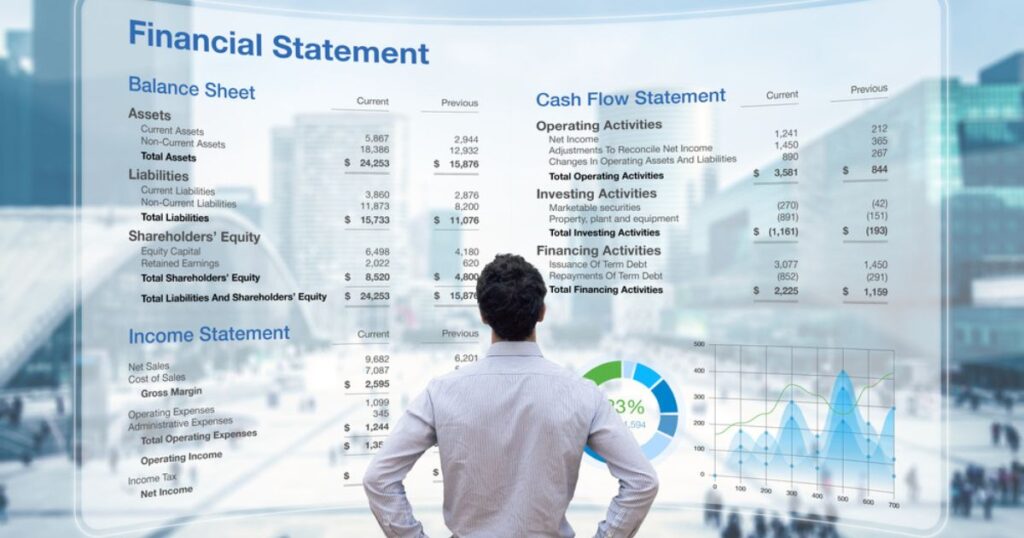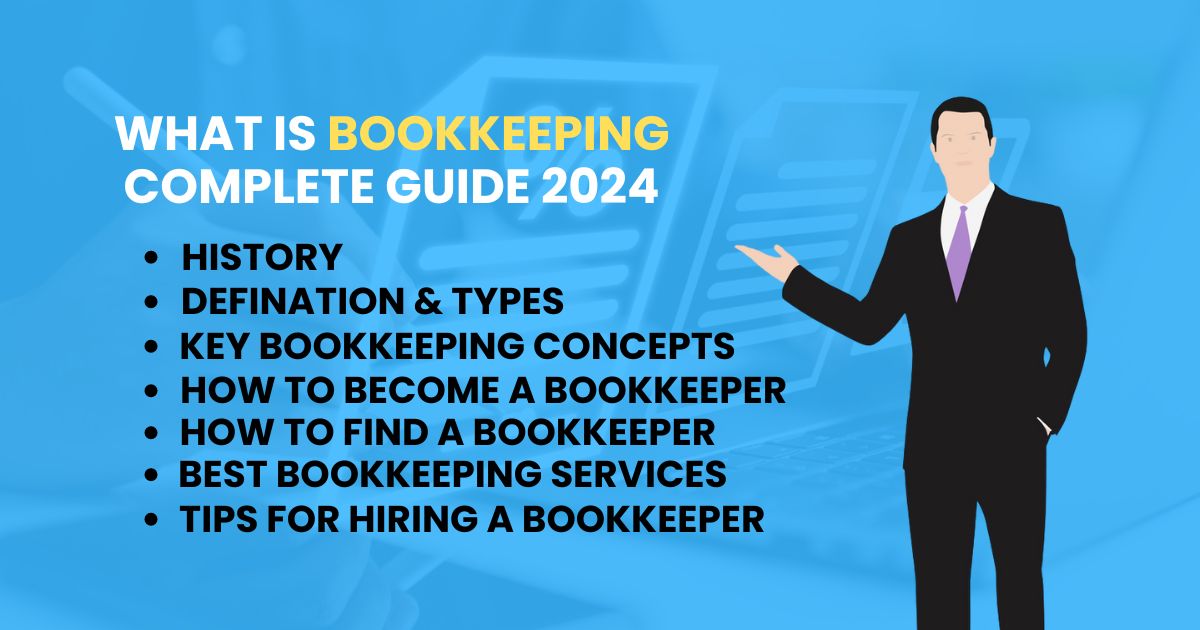Introduction
In any business, accurately tracking finances is vital. Bookkeeping is the process that ensures all financial transactions are recorded, helping business owners monitor their income and expenses. Whether it’s generating financial reports, preparing tax returns, or managing a general ledger, effective bookkeeping is essential for keeping business finances in check.
Without proper bookkeeping, managing day-to-day financial operations can become overwhelming. For small business owners, having well-maintained bookkeeping records is crucial for making informed decisions. Accurate balance sheets, income statements, and cash flow statements provide a clear picture of a business’s financial health, aiding in better planning and management.
The practice of bookkeeping has been around for thousands of years, dating back to ancient civilizations such as Mesopotamia and Rome. The modern approach to bookkeeping, particularly double-entry bookkeeping, was significantly advanced in the 15th century by Luca Pacioli (c.1447 – 1517). His work laid the groundwork for contemporary accounting practices and tools used by accountants and bookkeepers today.
As Luca Pacioli famously remarked, “No one can be a good merchant or entrepreneur without being a good accountant” (Pacioli, 1494). This highlights the enduring importance of skilled bookkeeping in maintaining a business’s financial integrity.
What is Bookkeeping?
Bookkeeping is the financial diary of a business, meticulously recording every financial transaction—from sales and purchases to bill payments and receipts. The bookkeeping process involves maintaining accurate bookkeeping records, including the general ledger, balance sheets, and cash flow statements. By tracking all day-to-day financial activities, bookkeeping provides a clear picture of a company’s financial health, enabling business owners to make informed decisions about their operations.
Acting as the backbone of business operations, bookkeeping ensures that business owners are always aware of their income, expenses, and overall financial status. This insight is crucial when considering investments, hiring new staff, or planning expansions. Additionally, organized bookkeeping is essential for generating financial reports, preparing tax returns, and staying compliant with tax laws. With accurate bookkeeping, businesses can maintain financial stability and plan for long-term success.
A. Benefits of Accurate Bookkeeping
- Financial clarity: Accurate bookkeeping provides a clear picture of a business’s economic health, including income, expenses, and profits.
- Informed decision-making: Reliable financial data enables business owners to make informed decisions about investments, expenditures, and strategic planning.
- Compliance: Proper bookkeeping ensures compliance with tax laws and regulations, reducing the risk of penalties, fines, or legal issues.
- Cost savings: Avoiding errors and discrepancies in financial records saves time and money associated with correcting mistakes or facing audits.
- Organizational efficiency: Well-maintained financial records simplify business operations, making it easier to track transactions, reconcile accounts, and prepare reports.
- Business growth: Accurate bookkeeping facilitates growth by providing insights into areas of profitability and opportunities for expansion or improvement.
- Stakeholder confidence: Investors, lenders, and other stakeholders rely on accurate financial information to assess the viability and stability of a business, enabling trust and confidence in its operations.
- Performance evaluation: Regularly updated financial records enable businesses to track their performance over time, identify trends, and measure progress toward financial goals.
- Risk management: Monitoring cash flow and financial trends helps businesses identify potential risks and take aggressive measures to mitigate them, safeguarding against economic instability.
- Transparency: Accurate bookkeeping promotes transparency in financial reporting, enhancing accountability and integrity in business practices.
B. Types of Bookkeeping
1. Single-Entry Bookkeeping
Single-entry bookkeeping is a basic method of recording financial transactions where each transaction is recorded once as either income or expense. It is commonly used by small businesses and sole proprietors to track cash flow and maintain simple financial records. In single-entry bookkeeping, transactions are typically recorded in a cash book or journal, with separate columns for income and expenses.
Pros and Cons
| Pros | Cons |
| Single-entry bookkeeping is straightforward to understand, making it suitable for small businesses with minimal transactions. It requires less time and effort compared to double-entry bookkeeping, making it cost-effective for small businesses with limited resources. | Single-entry bookkeeping needs to have the accuracy and completeness of double-entry bookkeeping. Since transactions are recorded only once, it can be prone to errors and inconsistencies. It may also need to provide more detail for businesses requiring complete financial reporting. |
2. Double-Entry Bookkeeping
Double-entry bookkeeping is a more advanced method of recording financial transactions that involves recording each transaction twice—once as a debit and once as a credit. It is based on the principle that every transaction has two equal and opposite effects on the accounting equation (assets = liabilities + equity). Double-entry bookkeeping provides a more comprehensive and accurate view of a business’s financial position and performance, making it suitable for larger companies and organizations.
Pros and Cons
| Pros | Cons |
| Double-entry bookkeeping provides a more accurate and complete record of financial transactions, reducing the risk of errors and fraud. It facilitates better financial analysis and decision-making by providing detailed information about assets, liabilities, and equity. It also enables businesses to prepare more sophisticated financial statements, such as balance sheets and income statements, which are essential for stakeholders and investors. | Double-entry bookkeeping requires more time, effort, and expertise compared to single-entry bookkeeping. It may involve a steeper learning curve for individuals unfamiliar with accounting principles and practices. Additionally, the complexity of double-entry bookkeeping may necessitate the use of accounting software or professional assistance, adding to the cost of implementation. |
ALSO READ THIS: Is Bookkeeping a Dying Profession?
Key Bookkeeping Concepts
A. Ledger
The ledger is like the master record of all financial transactions in a business. It serves as a central storage where transactions are recorded and categorized. Each transaction is entered into the ledger under specific accounts, providing a detailed record of the business’s financial activities. The ledger is essential for tracking cash flow, monitoring expenses, and preparing financial reports.
B. Accounts
Different Types and Their Roles: Accounts represent specific categories under which financial transactions are classified. Common types of accounts include assets, liabilities, equity, revenue, and expenses. Each account serves a unique purpose:
Assets: Assets are resources owned by the business, such as cash, inventory, equipment, and property. They represent value and contribute to the business’s financial worth.
Liabilities: Liabilities are obligations or debts owed by the business to external parties, such as loans, accounts payable, and accrued expenses.
Equity: Equity represents the owner’s stake in the business and is calculated as assets minus liabilities. It reflects the business’s net worth and ownership interest.
Revenue: Revenue is income earned from sales of goods or services and other business activities. It represents the inflow of money into the business.
Expenses: Expenses are costs incurred by the business to generate revenue and operate effectively. They include items such as salaries, rent, utilities, and supplies.
RECOMMENDED: What Does Balancing Account Mean?
C. Assets, Liabilities, and Equity
Assets: Assets are resources that provide future economic benefits to the business. Examples include cash, accounts receivable, inventory, property, plant, and equipment.
Liabilities: Liabilities are obligations or debts owed by the business to external parties. Examples include accounts payable, loans payable, accrued expenses, and mortgages.
Equity: Equity represents the owner’s residual interest in the business after deducting liabilities from assets. It includes the owner’s capital contributions and retained earnings.
D. Revenue and Expenses
Revenue: Revenue is the income generated from the sale of goods or services. It is essential for measuring the business’s performance and profitability.
Expenses: Expenses are the costs incurred by the business to generate revenue and operate effectively. Tracking expenses is crucial for managing cash flow and controlling costs.
E. Financial Statements
1. Balance Sheet
Components and Purpose: The balance sheet provides a snapshot of a business’s financial position at a specific point in time. It includes assets, liabilities, and equity and shows the business’s economic health and net worth.

2. Profit and Loss Statement
Components and Purpose: The profit and loss statement, also known as the income statement, shows a business’s revenues, expenses, and net income or loss over a specific period. It helps assess the business’s profitability and performance.

ALSO READ THIS: Super Due Dates 2024-25
F. Chart of Accounts
Explanation: The chart of accounts is a list of all the accounts used by a business to record financial transactions. It provides a standardized framework for organizing and classifying transactions.
Setup: The chart of accounts is typically organized into categories such as assets, liabilities, equity, revenue, and expenses. Each account is assigned a unique code or number for easy reference and tracking.
G. Journal Entry
A journal entry is a record of a financial transaction entered into the accounting system. It includes details such as the date of the transaction, accounts affected, and amounts debited or credited.
Examples: Examples of journal entries include recording sales revenue, paying expenses, receiving payments from customers, and borrowing money.
ALSO READ THIS: Four biggest challenges to small business growth.
Bookkeeping vs. Accounting: Understanding the Difference
A. Definitions and Key Differences
| Definition of Accounting | Defination of Accounting |
| Bookkeeping involves the systematic recording and organizing of financial transactions in a business. It focuses on the day-to-day maintenance of financial records, such as recording transactions, reconciling accounts, and generating financial reports. | Accounting encompasses a broader scope of activities beyond bookkeeping. It involves analyzing, interpreting, and summarizing financial data to provide insights into a business’s economic performance. Accounting also includes tasks such as financial analysis, budgeting, forecasting, and tax planning. |
B. Detailed Comparison of Roles and Responsibilities
| Bookkeeping Responsibilities | Accounting Responsibilities |
| 1. Recording financial transactions. 2. Maintaining financial records (ledger, journals, etc.). 3. Reconciling accounts (bank statements, invoices, etc.). 4. Generating financial reports (balance sheets, income statements, etc.). 5. Assisting with payroll processing. | 1. Analyzing financial data to assess performance and profitability. 2. Preparing financial statements and reports for stakeholders. 3. Budgeting and forecasting to plan future financial activities. 4. Conducting financial analysis to identify trends and patterns. 5. Providing strategic financial advice and guidance to management. |
C. Educational Requirements and Career Paths
| Bookkeeping Education Requirement | Accounting Education Requirement |
| Education: While formal education in bookkeeping is beneficial, it is only sometimes required. Many bookkeepers acquire skills through on-the-job training, vocational courses, or self-study. Career Path: Bookkeepers can pursue various career paths, including becoming certified bookkeepers or advancing to roles such as accounting clerks, accounting assistants, or office managers. | Education: Accountants typically require a bachelor’s degree in accounting or a related field. Some positions may require additional certifications, such as Certified Public Accountant (CPA) or Chartered Accountant (CA) credentials. Career Path: Accountants have diverse career opportunities, including roles such as staff accountants, auditors, tax specialists, financial analysts, controllers, or chief financial officers (CFOs). |
Daily Tasks of a Bookkeeper
- Recording transactions.
- Organizing financial records.
- Generating invoices and managing payments.
- Reconciling accounts.
- Preparing financial statements.
- Managing payroll.
- Filing tax returns.
RECOMMENDED: Leading Bookkeeper Adelaide Services at SYA
How to Become a Bookkeeper?
A. Educational Pathways
- Formal Education
While not always required, completing formal education in accounting, finance, or bookkeeping can provide a strong foundation for a career as a bookkeeper. Consider enrolling in courses or pursuing a degree program at community colleges, vocational schools, or universities.
- Online Courses
Explore online platforms offering courses in bookkeeping fundamentals, accounting software proficiency, and related topics. These courses provide flexible learning options and can be completed at your own pace from anywhere with an internet connection.
B. Gain Practical Experience
- Internships or Entry-Level Positions
Seek opportunities to gain practical experience in bookkeeping through internships, entry-level positions, or volunteer work. Hands-on experience will help you apply theoretical knowledge to real-world scenarios and develop valuable skills.
C. Develop Technical Skills
- Learn Accounting Software
Familiarize yourself with popular accounting software such as QuickBooks, Xero, or Sage. These tools are commonly used in bookkeeping roles, and proficiency in them is highly beneficial.
- Understand Bookkeeping Principles
Gain a solid understanding of basic accounting principles, including debits, credits, and double-entry bookkeeping. This foundational knowledge forms the basis of bookkeeping practices.
D. Refine Soft Skills
- Organization
Develop strong organizational skills to effectively manage financial records, prioritize tasks, and meet deadlines. Maintain orderly records and systems to streamline bookkeeping processes.
- Communication
Cultivate effective communication skills to interact with clients, colleagues, and stakeholders. Clear communication ensures an understanding of financial information and fosters positive relationships.
- Attention to Detail
Pay close attention to detail to ensure accuracy in recording transactions, reconciling accounts, and preparing financial reports. Even minor errors can have significant implications for financial records.
E. Stay Updated and Continuously Improve
- Continuing Education
Stay updated on industry trends, changes in accounting regulations, and advancements in technology. Pursue continuing education opportunities to expand your knowledge and skills in bookkeeping.
- Professional Development
Seek opportunities for professional development, such as workshops, seminars, or networking events. Engage with peers in the field to share insights and best practices.
F. Seek Certification (Optional)
- Certification
While not always necessary, obtaining certification can enhance credibility and career opportunities in bookkeeping. Consider pursuing industry-recognized certifications to demonstrate proficiency and commitment to the profession.
ALSO READ THIS: How to Set up Shopify Xero Integration?
How to Find a Bookkeeper?
A. Tips for Hiring a Bookkeeper
1. Define Your Needs
When businesses require professional bookkeeping services, they often turn to experts like those at Stream Your Accounting (SYA). Defining your specific bookkeeping needs and requirements is crucial to finding the right fit for your business.

2. Seek Recommendations
There are many online platforms where businesses can connect with qualified bookkeepers. These websites often have directories of experienced professionals, making it easy to find a bookkeeper who fits your specific needs. Simply browse the listings, review profiles, and choose the one that aligns with your business requirements.
RECOMMENDED: Questions to Ask a Bookkeeper
B. Where to Find Qualified Bookkeepers
1. Online Platforms
Stream Your Accounting (SYA) provides online platforms where businesses can easily connect with qualified bookkeepers. Our website offers a directory of experienced professionals, allowing businesses to find reputable bookkeepers tailored to their needs.
2. Professional Associations
If you’re looking for certified bookkeepers, consider exploring professional associations like the American Institute of Professional Bookkeepers (AIPB) or the Institute of Certified Bookkeepers (ICB). These organizations often have directories or recommendations for certified professionals, ensuring you can find a trustworthy bookkeeper.
3. Evaluating Potential Bookkeepers
When you have identified potential candidates, it’s important to interview them. This helps you assess their qualifications and determine if they’re a good fit for your business. Ask questions about their experience, skills, and how they handle bookkeeping tasks to ensure they meet your expectations.
ALSO READ THIS: What are the Current Accounting Trends?
4. Request References
To verify the credibility and professionalism of a bookkeeper, always ask for references from their previous clients. Checking these references can provide insight into their work quality and reliability, giving you confidence in your choice.
C. Importance of Contracts and Clear Expectations
When selecting a bookkeeper, it’s crucial to establish clear expectations from the start. Having a detailed contract that specifies the scope of work, responsibilities, and expectations helps ensure both you and the bookkeeper understand what is required. This clarity can prevent misunderstandings and ensure that the bookkeeping services provided align with your business needs.
Effective communication is also vital throughout the engagement. Regular and open discussions help both parties stay on the same page and address any concerns or changes as they arise. This ongoing dialogue ensures that the working relationship remains productive and that the bookkeeping services continue to meet your expectations.
Best Bookkeeping Services
When looking for top online bookkeeping services, start by researching your options thoroughly. Many websites provide detailed information about various services, including pricing, features, and customer reviews. This information can help you make an informed decision by comparing what different providers offer.
Next, compare the features of the bookkeeping services you’re considering. Look for services that offer customizable solutions, advanced reporting capabilities, and seamless integration with accounting software. These features can enhance the efficiency of your bookkeeping processes and ensure that the service meets your specific business needs.
ALSO READ THIS: Top 7 Virtual Bookkeepers Benefit
B. Criteria for Choosing the Right Service
When choosing the right bookkeeping service, scalability is a key factor to consider. Opt for a service that can grow with your business and adapt to your evolving needs. Flexible solutions will allow you to expand your bookkeeping services seamlessly as your operations increase.
Additionally, ensure that the service prioritizes security. Look for robust measures in place to protect your financial information, such as encryption and strict access controls. These safeguards are essential for preventing unauthorized access and ensuring your sensitive data remains secure.
C. Additional Features to Look For
When selecting a bookkeeping service, consider additional features that can add significant value to your business. One important feature to look for is integrated payroll services. These services can simplify payroll processing by handling calculations, tax withholdings, and reporting. This allows businesses to focus on their core operations while ensuring payroll tasks are managed efficiently and accurately.
Another valuable feature is assistance with tax document preparation. A good bookkeeping service will help with preparing and filing tax documents, guiding you through complex tax requirements. Their expertise can ensure you stay compliant with regulations and take full advantage of available deductions, reducing your tax burden and easing the overall tax process.
RECOMMENDED: Bookkeeping Services Brisbane
Final Thoughts
Understanding “what is bookkeeping” is essential for managing your business’s finances accurately. Bookkeeping involves recording and summarizing financial transactions to create important reports. This practice helps with tax preparation and provides a clear picture of your financial health. By using reliable tools and maintaining detailed records, businesses can enhance their financial management. As your business grows, seeking professional help with bookkeeping can simplify the process and keep your finances in order.


